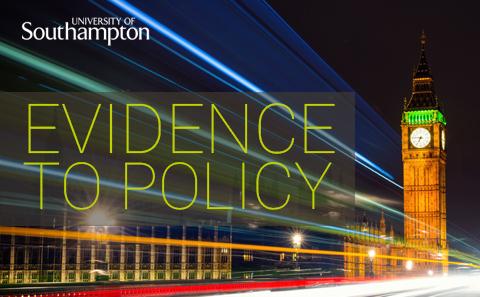
Read more on the future of technical education
Learn more from Senior Teaching Fellow Richard Cartwright about the future of technical and further education in Accounting

Over at least the last 20 years, and probably for much longer, different incarnations of the Science and Technology Committees from both the Commons and Lords have made recommendations about improving the Government use of science and research evidence in policymaking. Similar calls have been made over that period by others, such as the Royal Society and the Campaign for Science and Engineering.
The result has been change – change which often appears painfully slow at the time, but which taken over the period has led to real progress. That change has included the development of a network of Chief Scientific Advisors in Government departments, reinvigoration of the science and engineering profession within Whitehall (with similar networks for social scientists and economists), improvements to science advisory committees, and more exchange in and out of the civil service. In 2017, we have seen another welcome development, with Departments publishing Areas of Research Interest, questions in which they would welcome research evidence.
The job is far from done, of course, and more is needed. Pressure is – and should be – maintained on Government to keep the momentum for change going. But it is interesting to note that over the last two decades, most of the attention has been on the demand side of the equation – what is Government doing to seek and use evidence? Less focus appears to have been given to the supply side. Where is that evidence going to come from? And is it being prepared and supplied in a way that make it easy for policymakers to use?
In the UK, the majority of non-commercial research is carried out in the University sector. This means that, in this country at least, universities have a key role in providing evidence and expertise to Government. How do they do this? Do they have the skills, the resources and the motivation?
Parliament has a direct interest in this as well, of course. Select Committees, the Libraries of the Houses of Commons and Lords, the Parliamentary Office of Science and Technology – all draw on research evidence and expertise from UK universities. Are our universities geared up to deliver what Parliamentarians and their officials need? The recent report from colleagues in the Parliamentary Office of Science and Technology, The Role of Research in the UK Parliament[1], suggests they are not, with academic evidence being late and poorly presented, with a limited understanding among academics of how Parliament operates.
Those who know both worlds – that of the policymaker and the academic – know that they have very different drivers. The key currency in UK universities is academic time, and researchers never have enough of it. They are constantly making choices about how to prioritise, but in contrast to many other types of organisations, there is a high degree of freedom in those choices. The creative drive which makes universities so successful hinges on this independence within the academic community, and amongst individual researchers. All of which means, if universities want to increase the active participation of their researchers in working with policymakers, it’s not a question of telling them that they should. It’s about putting the right incentives in place.
So what are these incentives? One, of course, is money. Increasingly, funding is available for policy related activities, through impact-specific funding schemes (such as the Higher Education Innovation Fund, and the Impact Acceleration Accounts from different Research Councils) and from money for policy impact costed directly into research grants. The Research Excellence Framework provides the promise of future financial reward for universities with successful policy impacts, via Impact Case Studies. The 2014 REF was the first to include Impact Case Studies, and their contribution to the 2021 REF assessment has been raised from 15% to 20% - a firm signal that both money and prestige will come to universities succeeding in impact – including providing evidence and expertise for policymakers.
So money is available now, and increasingly in the future. Universities have most definitely noticed, and such financial incentives are definitely necessary – but there are not sufficient.
The second incentive is recognition. Academics careers are built on personal recognition. Whether seeking promotion internally or moving elsewhere for their next role (in what is a highly mobile industry), there are some key, measurable success factors Winning research grants, publishing in the right journals, speaking at conferences, teaching metrics, leadership roles – these are all part of that mix. Delivery of policy impact is now beginning, very slowly, to count for something, and universities can do more to incorporate such impact this into career progression, promotion and recruitment criteria.
To do so does however require clearer and more public recognition by policymakers of the individual contribution which academics have made. This is somewhat countercultural in the context of the civil service. In my 17 years in Whitehall, I wrote major elements of Government policy documents, provided the expert advice on policy areas I had the lead on, drafted articles for publication, and contributed to taking and implementing the decisions of Government. But rarely if ever was my name publicly displayed, and it didn’t need to be for me to build a successful career as a civil servant.
Policy decisions never hinge around a single piece of evidence and expertise, of course, and it is totally unrealistic to expect departments and ministers to credit individuals publicly with having “changed policy”. But there are ways in which departments can reflect the contributions which individuals have made, such as referencing individuals and/or publications from which they have drawn evidence, and we see this happening increasingly. Discussions on how best to do this should continue, involving universities, policymakers within departments and those within the wider public sector charged with monitoring policy impacts of academics in the REF and elsewhere. It could even form a part of the recently announced Knowledge Exchange Framework.
Finally in terms of incentives, universities can provide specialist support to academic staff to support their work with policymakers. In this regard, it is worth comparing policy work with that of interactions with business. Universities have developed increasingly sophisticated support structures over the last 30 years, both for interacting with established companies, and in supporting spin-outs and start-ups. People with expertise from the world of business were brought in, and have helped transform the enterprise agenda of many universities.
A similar trend is now beginning to emerge in support of public policy activities. Small units are appearing in a number of universities, including the one I lead at the University of Southampton. These teams vary in size and function, and it’s clear that – as in the early days of Technology Transfer Offices – there is no established model. Many are time-limited, with universities experimenting and waiting to see the results. Several have drawn in expertise from the policy-making community – making good use of a contracting civil service since the financial crisis.
As universities begin to explore more central and coordinated support for increasing links between academics and policymakers, a number of general themes are emerging where they are focussing their effort. They include:
It’s not yet clear how these policy units will develop. They could be a flash in the pan initiative, or a start of a new established area of university business. Either way, their development demonstrates two things. Firstly, that Universities are taking more seriously the need to up their game in terms of supporting policymakers (if only because there’s future money and prestige in it). And secondly, that it’s difficult, and needs a different set of skills.
I started by saying that there had not been enough focus on the supply side of the evidence to policy equation. But of course, supply and demand are linked. The more policymakers ask for evidence, the more universities will improve how they deliver it. And the easier it is supplied for policymakers to use, the more they will seek it out. So my hope is that the next review to look at Government’s use of evidence in policy making (and I have no doubt that there will be another one) will also question and challenge what universities are doing to supply that evidence.
Gavin Costigan
Director, Public Policy|Southampton
[1] Kenny, C., Rose, D.C., Hobbs, A., Tyler, C. & Blackstock, J. (2017) The Role of Research in the UK Parliament Volume One. London, UK, Houses of Parliament

Learn more from Senior Teaching Fellow Richard Cartwright about the future of technical and further education in Accounting

Catch up with past articles from researchers at the University of Southampton